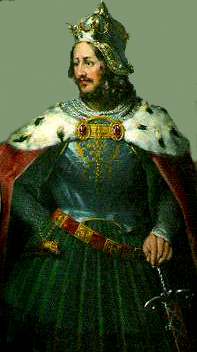This article includes a list ofgeneral references,butit lacks sufficient correspondinginline citations.(September 2023) |
William of Winchester(11 April 1184 – 13 December 1213), also called in EnglishWilliam of Lunenburg(German:Wilhelm von Lüneburg) orWilliam Longsword,[1]a member of theHouse of Welf,was heir to his family'sallodiallands in theDuchy of Saxonyafter the deposition of his father, DukeHenry the Lionin 1180.
| William of Winchester | |
|---|---|
| Lord of Lunenburg | |
 | |
| Born | 11 April 1184 |
| Died | 13 December 1213(aged 29) |
| Spouse | Helena of Denmark |
| Issue | Otto I, Duke of Brunswick-Lüneburg |
| House | Welf |
| Father | Henry the Lion |
| Mother | Matilda of England |
Life
editWilliam was the fifth and youngest son ofHenry the LionandMatilda,the eldest daughter of KingHenry II of EnglandandEleanor of Aquitaine.[2]He was born inWinchester,Englandduring his father's exile;[3]he probably remained there when Henry returned to Saxony and was raised at his uncle KingRichard I's court.
After his unsuccessful uprising, Henry had submitted to theHohenstaufenemperorFrederick Barbarossain 1181 and though he had to leaveGermany,he could retain the Welf possessions aroundLüneburg,Brunswick,andHaldensleben.He finally reconciled with Frederick's son and successor EmperorHenry VIin 1194 and surrendered his younger sons William andOttoas hostages for the payment of the ransom for the release of their uncle King Richard. William was extradited to DukeLeopold V of Austriaand temporarily held inHungary.
When Henry the Lion died in 1195, William, Otto and their elder brotherHenry Vinherited his Saxon allods. The Welf brothers entered into an agreement withAdolf of Altena,archbishop ofCologne,who in 1198 crownedOtto,King of the Romansduring the throne quarrel with the Hohenstaufen heirPhilip of Swabia.Upon the death of their maternal uncle King Richard in 1199, William and Henry again went to England in order to assert their inheritance claims against their maternal uncleJohn Lackland,though to no avail.[citation needed]
After the Danish conquest ofHolsteinin 1201, William metValdemar,the brother of KingCanute VI of DenmarkinHamburg,where he arranged his marriage with the king's sisterHelena.[1]Both entered into matrimony in spring 1202, accompanied by the provision of a significant dowry. Their only child wasOtto(1204–1252),[1]who inherited his father's property and became the first Duke ofBrunswick-Lüneburgin 1235.
William's hopes to assume the rule in Holstein, however, were disappointed by the Danish court. In May 1202, the Welf brothers met atPaderborn,where they divided their father's heritage. William received the northern territories up to the Danish border around the town ofLüneburg,the territory ofLauenburgbeyond theElbeRiver,Hitzacker,Lüchow,andDannenberg,as well as the lands aroundHaldenslebenand in the easternHarzmountain range includingBlankenburgandHeimburgwithRegenstein Castle.William concentrated on consolidating his rule, strongly relying on thesalttrade around Lüneburg, which became his permanent residence.
Upon William's death in 1213, Otto IV acted as a guardian for his brother's son Otto the Child. As both Otto IV and his brother Henry V died without male heirs, Otto the Child became sole ruler of the Welf possessions and progenitor of all Dukes of Brunswick-Lüneburg.
References
edit- ^abcAnderson, James (1732).Royal Genealogies: or, the genealogical tables of emperors, kings and princes, from Adam to these times in two parts.James Bettenham. p. 515.Retrieved9 April2012.
- ^Loud & Schenk 2017,p. xxi.
- ^Webster 2021,p. 96.
Sources
edit- Loud, Graham A.; Schenk, Jochen, eds. (2017).The Origins of the German Principalities, 1100-1350: Essays by German Historians.Routledge.
- Webster, Paul, ed. (2021).History of the Dukes of Normandy and the Kings of England by the Anonymous of Bethune.Routledge.